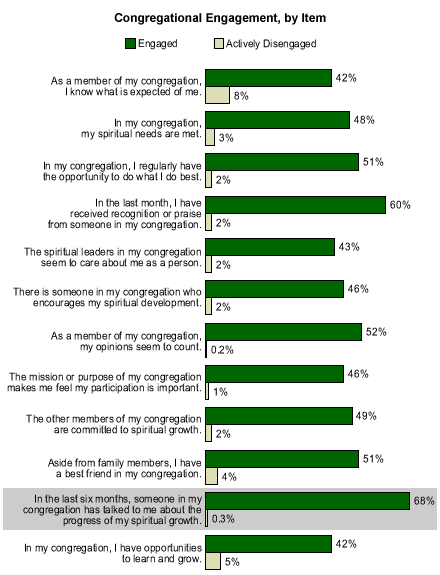优蜜传媒research has consistently shown that faith community leaders' failure to follow up with members is a problem in most U.S. congregations. According to Gallup's most recent congregational engagement survey, conducted in November and December 2002*, only 23% of members of faith communities "strongly agree" with the item, "In the last six months, someone in my congregation has talked to me about the progress of my spiritual growth." While we have known about the importance of this kind of follow-up for some time (see Related Items), a fresh look at the data confirms that importance.
It's a common story in congregations across the country: The Smiths, a new family in the community, go "church shopping," and after visiting five churches, they decide to join one. The Smiths go to new member classes, learn all about the church and its mission, are told about the opportunities for service, find out about the various Bible studies and social groups, and agree to the terms of membership. Then on "New Member Sunday," the Smiths and their children repeat the membership vows in front of the congregation, and are introduced and welcomed. If they're lucky, they will get a call from the new member coordinator and be asked to be greeters for three Sundays next month.
From that point on, more often than not, the Smiths are on their own. Unless they show initiative and join a small group or class, no one follows up with them to see if they are growing spiritually, to answer membership questions, or to review the meaning and expectations of being a church member. So the Smiths, like millions of members of faith communities across the country, just assume they know what is expected of them, and their spiritual growth (if there's any growth at all) is a private matter that isn't shared with anyone else in the congregation.
Gallup's new analysis of the data from the 2002 survey indicates that following up with members like the Smiths and discussing their spiritual growth is one of the best things their faith community leader could do to get them engaged in their congregation. Gallup researchers looked at the percentage of members who "strongly agree" with each of the 12 congregational engagement items, and then broke each of these groups into "engaged," "not engaged," and "actively disengaged" members. Sixty-eight percent of members who strongly agree with the "progress" item are engaged in their congregations -- a higher percentage than for any of the other 11 items. Less than 1% of those who strongly agree with this item are actively disengaged.

Bottom Line
Following up with members concerning the progress of their spiritual growth is crucial to keeping them engaged in their congregations. Individuals want and need to be held accountable to the organizations that are important to them. But in order to be effective, the feedback that members receive from their congregation leaders also needs to be positive, focusing on their spiritual strengths rather than their weaknesses. Giving people the opportunity to talk about their spiritual successes is a key ingredient to engaging them in the life of their congregation.
*Results are based on telephone interviews with 1,000 adult members of a church, synagogue, or other religious faith community, aged 18 and older, and 500 non-members, conducted in November and December 2002. For results based on this sample, one can say with 95% confidence that the margin of sampling error is ±2.6%.
